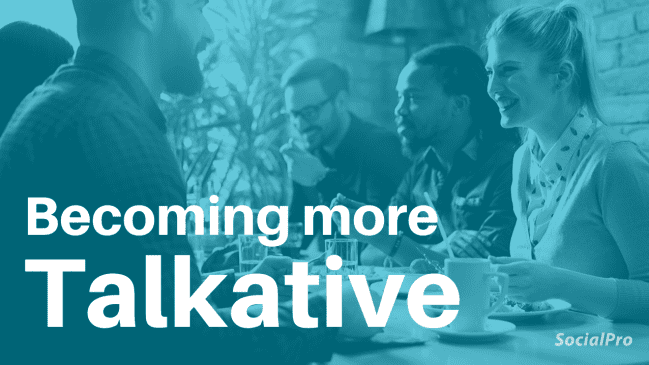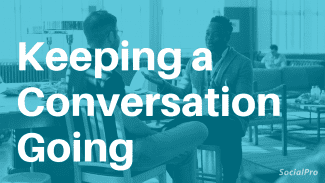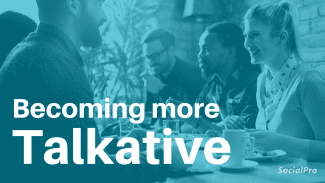As an introvert, being talkative didn’t come naturally to me. I had to learn as an adult how to talk more. This is how I went from quiet and sometimes shy to an outgoing conversationalist.
1. Signal to people that you are friendly
If you don’t talk much, people might think it’s because you don’t like them. As a result, they might avoid interacting with you. Do small things to show that you are friendly. When you do, people will be more motivated to interact with you, even if you don’t say much.
Here are some ways you can be more friendly:
- A genuine, friendly smile when you meet someone.
- Showing that you listen by making eye contact, making the appropriate facial expressions, and saying “hmm” or “wow”.
- Asking people how they are and what they’ve been up to.
2. Use small talk to find mutual interests
Why is small talk necessary? It’s the warm-up that tells you if there’s a possibility for real conversation. It can feel meaningless, but remember that all friendships start with some small talk.
During small talk, I ask a few questions to see if we have any mutual interests. Things like “What are your plans for the weekend? What do you like the most about your job? Or, if they don’t seem to like their job: What do you like doing when you’re not working?” If they provide something slightly personal in the exchange, I’ll pick up on what they said and make a comment that reveals something about me.
Have a look at this article if you’d like some tips on how to make small talk.
3. Ask gradually more personal questions
Proceed with a few more direct questions based on what they’ve told you. Discussions tend to deepen and get more interesting when we ask follow-up questions.
A superficial question like “Where are you from?” can lead to a more interesting conversation if you were to follow up with, “How come you moved?” or “What was it like growing up in Denver?” From this point on, it’s natural to discuss where you see yourselves in the future. In between your questions, share your own story, so they get to know you, too.
4. Practice in everyday interactions
Practice your conversation skills in day to day situations by making casual comments when you’re at the grocery store or a restaurant.
Ask the waitress, “What do you like to eat off the menu?” Or “This is the fastest line going right now” to the cashier at the grocery store. Then wait for their response. By having simple interactions like this, you’re practicing your ability to be more talkative.
5. Say it even if you think it’s uninteresting
Lower your standards for what you feel is worth saying. As long as you aren’t rude, say what comes to mind. Make an observation. Wonder about something out loud. Empathize with someone when you see they are tired, frustrated or overwhelmed.
What might feel like meaningless statements to you can inspire new topics and signal that you’re open to talking.
6. Talk about what’s going on around
You can fill those sometimes awkward silences with quick, out loud thoughts about what’s going on or your opinion about something. Stick to positive experiences. Things like, “That’s an interesting painting.” Or “Did you try the new food truck outside? The fish tacos are insane.”
The art of talking is when you’re comfortable to share your thoughts with those around you.
7. Ask questions when you wonder about something
Throw an idea out into the world and see what comes back. Casual questions like, “Does anyone know where the holiday party is going to be this year?” or “I’m going down to Dark Horse Coffee. Anybody want something when I go?” or “Has anybody seen the latest Terminator movie? Is it any good?” You want input – the world is there to provide.
8. Experiment with coffee, not just for mornings
Coffee has many redeeming qualities. The best is energy. If you find social situations leave you feeling flat and you have to psych yourself up to attend them, consider having a coffee beforehand. A little coffee can give you the push you need to chat through that cocktail party or dinner.[7]
9. Give more elaborate responses than yes or no
Answer a Yes/No question with a bit more information than requested. Let’s take the standard work question, “How was your weekend?” Instead of saying “Good,” you can say, “Great, I binge-watched Peaky Blinders on Netflix, ate take out and went to the gym. How about you?” Adding a personal bit of information can inspire new conversation topics.
10. Share as much as the one you’re talking to
For a conversation to get deep and engaging, we need to share things about ourselves. If someone says, “I went fishing this weekend at the lake,” and you respond, “That’s nice,” you’re pretty much done. However, if you ask more about their trip and then reveal, “I used to go to my grandparent’s cottage every weekend as a child.” Now you can talk about cottaging, boats, fishing, country life, etc.
11. Switch topics if one dies out
It’s fine to change the subject when you feel done with the current one.
I was in line at a friend’s brunch the other day and started talking to the lady in front of me. We chatted about baseball for a minute because she ran a competitive baseball team. I racked my brain for as much baseball knowledge as I had, but after two minutes, I was out of ideas. I changed tactics and asked her how she knew my friend, the brunch hostess. That got us off on a long story about their childhood together. Nice!
Being more talkative in a group
1. React to the conversation to show that you listen
You’re in a group, and everyone is jumping into the conversation, effortlessly talking over each other. You’re wondering, how do I join and engage in the conversation? Try this:
- Pay attention to each speaker
- Make eye contact
- Nod
- Make agreeable noises (uh-huh, hmmm, yes)
Your reactions make you part of the conversation, even if you don’t say much. The speaker will gravitate to you because they have your attention, and you’re encouraging them with your body language.
2. Don’t wait for the perfect time to talk in a group
The first rule of group conversations: there is NO PERFECT TIME to talk. If you wait for it, it won’t come. Why? Someone more energetic will beat you to it. Not because they’re bad or rude, they’re just faster.
The rules are not the same as when you’re talking with just one person. People interrupt, talk over each other, make jokes, and recover. You don’t have to wait until someone is done talking; it’s socially acceptable to cut in a little quicker than we do in a one-on-one conversation.
3. Talk louder than usual and look them in the eye
I’m blessed with a quiet voice. I hate raising it. It feels artificial and forced if I do. So how do I speak loud enough in a group to get their attention and be heard?
I take a breath, look everyone in the eye and raise my voice just enough so they know I’m not stopping, and they need to pay attention. It’s all about having firm intention and confidence. Don’t ask permission. Just do it.
Here’s our guide on how to speak louder.
4. Start a side conversation with someone else who’s not active in the conversation
If the whole crowd thing intimidates you, and there’s someone there who isn’t an active part of the conversation, focus on one person instead. Ask that person a question and start a side conversation. Or, if it’s a topic interesting to everyone, ask it loud enough for the group to hear, but only one person can answer. If the group talks about skiing, you can say, “Jen, you used to ski a lot, do you still do that?”
Doing this is useful if you want to contribute to the group conversation but don’t want to compete for space in the crowd.
Dealing with underlying reasons for being quiet
1. Examine if the reason for not being talkative is in fact shyness
Shyness is when you get nervous in front of others. It can be a fear of negative judgment, or it can stem from social anxiety. It’s different from introversion in that introverts don’t mind social environments – they simply prefer quieter ones. So how do you know if you are shy or just introverted? If you fear social interactions, you are more likely to be shy rather than introverted.[1][2]
Here’s more on how to overcome shyness.
2. Change the way you talk to yourself if you have low self-esteem
Our self-esteem can be the elephant in the room when we’re meeting new people. It might tell you that everyone knows you’re nervous. It can make you believe that they dislike your clothes, your posture, or what you said. But how do we know what other people think?
When we believe others think poorly of us, it’s usually because we think poorly about ourselves. You can start changing this by changing the way you talk to yourself.[3]
Instead of saying, “I always say the wrong things,” try to remind yourself of a time when you didn’t say the wrong thing. You probably can. When you do, you get a more realistic view of yourself other than “I suck.” Doing this can improve your self-compassion and make you feel better about yourself so that you’ll worry less about being judged.[4][5]
To read more about changing negative thought patterns, have a look at this article.
Another option is to seek out a therapist to help you change the way you talk to yourself.
We recommend BetterHelp for online therapy, since they offer unlimited messaging and a weekly session, and are cheaper than going to a therapist's office.
Their plans start at $64 per week. If you use this link, you get 20% off your first month at BetterHelp + a $50 coupon valid for any SocialSelf course: Click here to learn more about BetterHelp.
(To receive your $50 SocialSelf coupon, sign up with our link. Then, email BetterHelp’s order confirmation to us to receive your personal code. You can use this code for any of our courses.)
3. Gradually increase your interactions if you want to be more talkative as an introvert
Being more social is a muscle anyone can develop. In fact, people can change where they sit on the introversion/extroversion scale over their lifetime.[6]
For introverts to enjoy socializing more and feel less drained of energy, it’s best to start slowly and try a few things every day. Things like:
- Talk to one new person
- Smile and nod at five new people
- Eat lunch with someone new each week
- Engage in conversations and add more than a yes/no answer.
Have a look at this article for more tips on how to become more extroverted.
4. Read books that can help you be more talkative
Here are a few book recommendations that can help you understand the components of good conversation and how to use them to connect with people.
- How to Win Friends and Influence People – Dale Carnegie. Written in 1936, it’s still the gold standard for developing better social skills and becoming a more likeable person.
- Conversationally Speaking – Alan Garner. This one is also a classic. It’s for those who want to become better conversationalists and know that the techniques described are all science-based. Some of the advice may seem obvious, but once explained, you will see it in a whole new light that will resonate with you.
All our book recommendations on making conversation.
5. Read books that can help you overcome social anxiety or low self-esteem
Sometimes there are underlying reasons for not talking, such as social anxiety or low self-esteem. If you can relate to this, here are two great books for you.
- Shyness and Social Anxiety Workbook: Proven, Step-by-Step Techniques for Overcoming Your Fear – Martin M. Antony, Ph.D. This one is written by a physician who uses exercises based on Cognitive Behavioural Therapy (CBT) to help you overcome your social fears. More like talking to a therapist than a friend, it can be dry if you are looking for more personal anecdotes than exercises. If you want proven techniques, this is the right one to pick up.
- How to Be Yourself: Quiet Your Inner Critic and Rise Above Social Anxiety – Ellen Hendriksen. If worrying about being judged is what makes you less talkative, this book is for you. I was hesitant to read this one because of the girl on the cover, but it’s relevant for guys too. It’s one of the best books on how to deal with self-doubt.
All our book recommendations when dealing with shyness or social anxiety.






i wish to be talkactive
This website is very helpful articles of increasing talkative
Thanks
Wow, this is one of the most *actually* helpful articles I’ve ever read on the internet. I genuinely have always believed I should not say something if it is not very interesting, correct, or fascinating, which has held me back a lot in conversations. To know that it’s perfectly okay to say things, even if they are not interesting, opens up a whole new world for me. I know it will probably take some time to actually put it into practice, but I feel a strong sense of relief knowing it’s okay to say more random, inconsequential things. I also genuinely did not know that it’s socially acceptable to slightly interrupt in group conversations. That explains why I always feel like I’m the only one who can never get a word in when I’m in a group! I’m terrified of being rude and interrupting someone, so I always wait for them to finish – but someone always gets there first. Thank you for this article. I received therapy for social anxiety for 6 months and some of the strategies and ideas here are ones that it took months for me and my therapist to realize I needed to hear them.
First you need to have friends and socialise
I feel you bro
Always articles on how to be more talkative, more of an extrovert. Where are your articles on how extroverts can learn to have real conversations and not just talk about themselves?
I am so much and forever gratefull for this website.I find everything in this website super helpfull.
I am really really grateful for this website. I just recently done the quiz and i hope i start making more friends and also get closer to my original friends and maybe i hope to find my soulmate. Thanks!
Thank you very much for this. I have difficulties in talking, and I hope I could implement these great advice ! 🙂 Thank you once again
Hello there Angel?